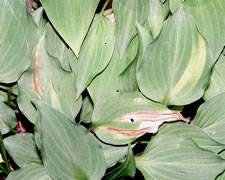Nematodes are a type of roundworm – very small and transparent, they frequently go unnoticed. However, these plant parasitic nematodes can cause significant damage to the roots and foliage of garden plants. Foliar nematodes live in and feed on the leaves and buds of plants such as peonies, hostas, chrysanthemums, begonias, columbines and azaleas.
Gardeners and landscapers with a foliar nematode problem will notice sections of the leaf first turn yellow, than purplish brown, and finally completely brown. If treated when symptoms first appear, the following application can significantly reduce nematode populations, minimizing plant damage.
ZeroTol is a broad spectrum algaecide, bactericide and fungicide based on peroxygen chemistry (27.0% Hydrogen Peroxide and 2.0% peracetic acid). The label has wide applications for greenhouse/nursery use. It can be applied as a foliar spray, soil drench, fog or mist for disease and algae control. For foliar nematode control, the recommended rate would be 1:100 applied at 5 day interval. The product works as a contact kill and has no residual benefits. Hence, applying early when initial foliar disease symptoms appear or even better if applied as a preventative (before symptoms appear) on a 5 day interval is recommended. This study proved that ZeroTol can be very effective on leaves and also in soil. The other attributes of ZeroTol is that it has no residual concerns and can be safely tank mixed with most fungicides and insecticides.

One of BioSafe System’s newer products, AzaGuard, is a broad spectrum botanical insecticide/nematicide. The active component in AzaGuard is a 3.0% Azadirachtin. Azadirachtin is a natural liminoid present in seeds of neem tree and was shown to be very effective in insect and nematode control by it’s properties as an insect growth regulator (IGR), oviposition inhibitor and also as a natural repellant.
ZeroTol can be safely tank mixed with AzaGuard and our recommendation for foliar nematode control is to tank mix ZeroTol with AzaGuard ( 1 gallon of ZeroTol + 22.5 fl.oz of AzaGuard per 100 gallons of water) and spray once every 5-7 days.
